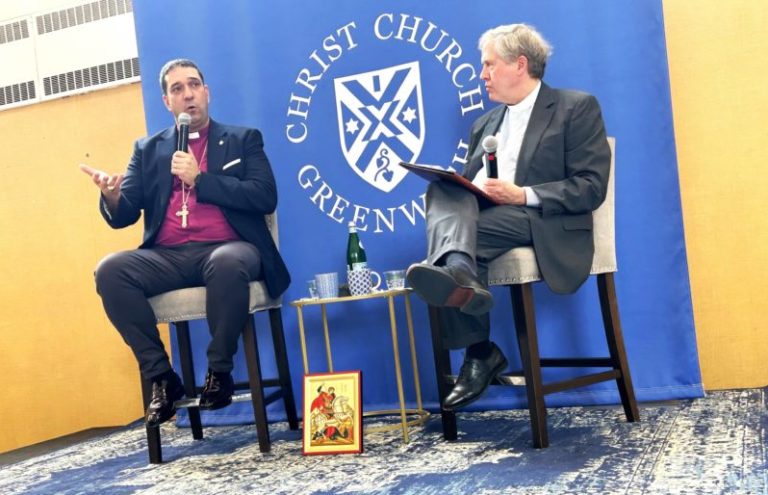By Drew Williams
Sentinel Columnist
Have you ever feared that to be a person of faith would be to somehow give up being you? I recall very clearly that this was a huge concern to me. This fear was fed by the rather ungracious caricature that I had constructed within my own mind about the type of people who went to church—a caricature that was unwittingly aided and abetted by the Church of England (the denomination that I was later ordained in) when it ran a recruitment drive under the banner, “Are you 45 and going nowhere? How about a career in the Church of England?”
As a child, I sang in a church choir and this gave me plenty of opportunity, from my elevated position in the choir stalls, to scrutinize the congregation and pass judgment. I recall one evening all of us choirboys were invited to attend an evening talk. I was not keen, but we were incentivized by the promise of a delicious treat. I sat all evening on a hard wooden floor so bored and so hungry that I wanted to eat my own shoes. And then, finally, the “delicious treat” was revealed. It was a half-eaten box of chocolates with only the unpopular flavors remaining. As a seven-year-old child, I immediately formed the view that Christians were the kind of people who got overly excited by a very uninspiring box of chocolates, and I knew there were better chocolates out there!
So, for many years, I mistakenly believed that to be a Christian, to be “one in Christ,” would be to give up on being me—that my personhood was in danger of being annihilated, merged, fused… dissolved! But when Jesus prays for us, “…that they may all be one, just as you, Father, are in me, and I in you, that they also may be in us” (John 17:21) it is, in reality, a unity of distinct persons, not an annihilation of personhood. The Father, the Son and the Holy Spirit are so united that they are utterly one, and yet their individuality is all the more distinct because of their unity. They never cease to be the Father, Son and Spirit. They never cease to be three. And so it is with us. We shall not be dissolved into God like an Alka-Seltzer. We need not fear that in loving God we lose our individuality. We will certainly need God’s help to shed our selfishness and our self-assertiveness and our self-promotion—but never our true selfhood.
C.S. Lewis suggests that this is like describing to people who have only lived in darkness that a great light was coming to them. It would be entirely reasonable for them to fear that as they were to be illuminated by the same light they would therefore become indistinct: a kind of “white-out” or “snow-blindness” would prevail. Lewis holds up a greater truth when he reminds us, “You and I know that the light will in fact bring out, or show up, how unique they are.”
I don’t know why, but I have always felt things deeply. When I was in first grade and my teacher would berate one of my classmates, I would be the one who cried! Every invective that the teacher threw at my classmate went right to my heart as if it were personal. Many times, I would be sent out of the classroom before the teacher disciplined another pupil. At parent-teacher conferences my teacher would shake her head despairingly and say, “The problem with Drew is that he has a very gentle heart.”
What six or seven year-old boy wants to hear that? I suspect that my parents hoped that I would grow out of it (I know I certainly did). Ironically, my “gentle heart” got me into a lot of schoolyard fights—and I started most of them. It was not that I was by any means perfect, but when I saw some injustice, some unkindness or bullying, I would feel it so keenly that I just had to say something. My friends would say, “Why do you always have to be the one to say something?!” Even when I was in a fight I found it difficult to hit back so that it would really hurt the other person.
Years later, toward the beginning of my faith journey, I wandered into a church in central London to join in their worship. At the end of the service, there was an invitation to be prayed for. I thought, “why not?” Anonymously, I wandered over to the prayer team and someone offered to pray with me. As he began to pray, the man paused and said, “Forgive me, I know this may sound a little bold, but I have the keenest sense that the Lord would say to you, ‘I love your gentle heart.’” I always felt that must have been God speaking to me because, not least, He knew what trouble this gentle heart had gotten me into!
God made us and He wants to remake us, not unmake us. God wants to relate with us, not absorb us. We remain who we are. Actually, in truth, we finally become who we were always meant to be.
Speaking for each of us, King David knew something of this when he wrote, “For you [Lord] formed my inward parts; you knitted me together in my mother’s womb. I praise you, for I am fearfully and wonderfully made” (Psalm 139:13-14a)..
The Rev’d Drew Williams, Senior Pastor of Trinity Church, has been living with severe, debilitating chronic pain for more than three years. He knows the desperation that comes with wondering if he would ever be pain free. At the same time, he shares, “By the grace of God, that desperation has also brought an increased intensity and honesty, as well as a deeper intimacy, in my relationship with God.” He now shares something of his struggle in a series of devotional writings for the Greenwich Sentinel.




